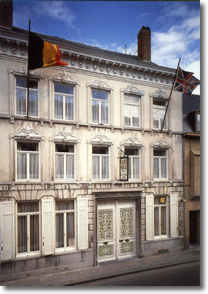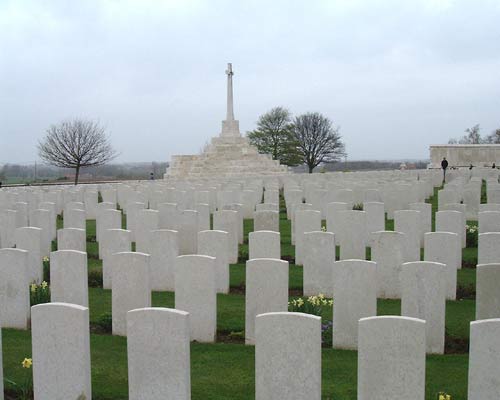Six
Days In The Ypres Salient
Part
Two: Toc H And 'Pop'
|
Talbot
House in Poperinghe
Talbot House in
Poperinghe (a few miles to the rear of Ypres) was our special surprise
visit on the last night. This was named after Gilbert Talbot, one of these
will-go-far officers killed early in the war.
It was a place
of rest and relaxation, without hierarchy of rank; indeed it was often
the officers who had to sleep on the landing, while the other ranks got
the bedrooms.
It was a place
where singsongs were sung and where services were conducted in the attic
chapel by the Rev. Tubby Clayton (whom one of the older tourists knew
well, being a Toc H official himself).
|
|
|
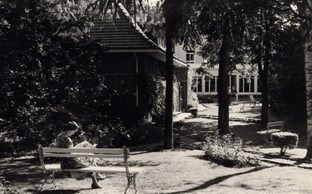
The
Garden At Talbot House
|
The leafy garden
could also provide a few hours of relaxation away from the Front; it had
an entrance to an underground vault where much stuff (even airmen!) was
hidden when the Germans invaded in the next war. Lots of other WW1 mementoes
were spirited off to other addresses, to be returned in 1945, when the
Germans were driven out.
Talbot House
was still furnished in much the same way as in 1918, with some fascinating
photograph albums, while some of the original wooden battlefield crosses
were stacked against walls in the attic.
|
Singing
The Old Songs For Frank
Back to our narrative:
we came down to dinner at our hotel unsuspectingly, but one of our tourists
had sneaked off with his folding bicycle, and hidden himself, dressed in an
old Royal Naval Division uniform. On a signal he cycled up to us as a messenger
and informed us we had been invited to Talbot House at Poperinghe for the evening.
Belgian Toc H staff,
the Buglers from the Ypres Fire Brigade and various other Brits and Belgians
were also invited. Beer flowed. A singsong developed (anticipated by the handing
out of prepared song sheets). "Tipperary", "When this Rotten War Is
Over", "Keep The Home Fires Burning", "Good-bye-ee" were some
of them.
You think of these songs
as quintessentially British so it was a surprise to hear "Roses Of Picardy"
being lustily sung by the person standing beside me in a strong Belgian accent.
"Tipperary" was
then sung for the nth time, but in honour of Frank the veteran. Tears welled
in all our eyes. He'd never actually been in 'Pop', although he used to say
when a heavy shell passed over Ypres, "There's another
one for 'Pop'".
A great deal of fuss
was made of Frank during the tour, to general approval; everyone loved him.
The local Belgian paper took photographs of him in the garden. This was where
the Ypres firemen (who had secretly brought along their bugles) gave us renditions
in his honour of the 'normal' (infantry version) and the less well-known cavalry
version of the Last Post.
While the songs were
being sung there were some (mainly ex-RAF types you'll be glad to know) who
sang the crude versions (well, excising the odd word). There was one chap from
99 & 101 Squadrons, another from 87 (South African based). Old Bill, an immaculate
Englishman who never went anywhere (and this included the trenches) without
his rolled up umbrella, turned out to have been a Chindit - some said a Colonel,
although he was of the old school which "respected
a person's privacy" above all - and thus never talked about it.
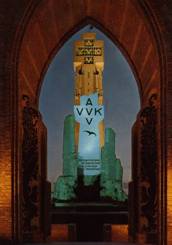
The
VVK-AVV Memorial
|
Dixsmuide
And The VVK-AVV Memorial
We visited the
preserved Belgian "Trenches Of Death", where the surprise at the far end
(underneath tunnels, and sometimes several inches deep in water) was a
demarcation stone, showing just how close the Germans had reached, while
the big Belgian VVK-AVV memorial near Dixsmuide turned out to be in reality
a memorial to Flemish separatism.
Information about
the memorial was given in several translations, but the story was rather
different in the French and Flemish translations. The French one was all
about fighting together etc, but the Flemish one told an entirely different
story: the six Belgian heroes commemorated here had been shot in the back
by their Francophone officers.
|
|
Spanbrokmöelen
The postcard I
sent you was of Spanbrokmöelen - the site of one of the really big mine
craters of the Battles of Messines attack in June 1917, where 19 mines
were exploded under the Germans (the explosion was heard in the UK).
Toc H bought the
site, filled it with water and renamed it the 'Pool of Peace'.
It is one of the
most exquisitely beautiful sites I have ever been to.
|
|
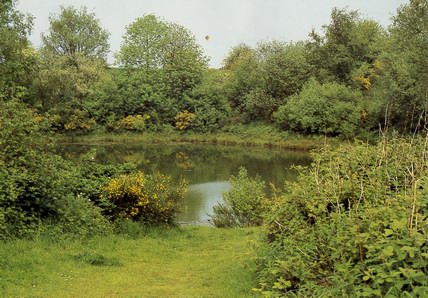
The Pool Of Peace At
Spanbrokmöelen
|
|
|
We
visited - one of the first visits in fact - the Tyne Cot
British Cemetery near Passchendaele. This is the biggest British
cemetery on the Western Front and with the roses in full bloom, must have
been at its most piquant, with row after row of graves with their bittersweet
inscriptions (12,000 of them, plus a large number, possibly 50,000 of 'no
known grave'). After looking at a few inscriptions they seem to leap out
at you, giving you the impression that you can determine the particular
sort of anguish the person who paid for these extra words was going through.
|
|

|
The simpler
they were, the more evocative: e.g.
"He came
from sunny South Australia
And died doing
his duty",
"He saved others,
but himself he could not save",
"He was our
only son",
"He was the
son of his father", or
"Called to higher
service"
|
I stopped here because
I was going to rewrite the story, but having left it a week I suspect I will
take forever and it might be no better, so here it is.
All best wishes Geoff
Response
From Father "I have reread your most enjoyable account of your trip.
Steeped as you are in the Western Front all these places with your imagination
come to life I've no doubt. As you may have read, I've been reading "Goughie"
and your accounts of your trips made much of his story and the background to
it all vivid & clear. What a travesty of justice though! Reminds me of two chaps
whom I thought were ill treated in my war: Dowding of Fighter Command and 'Butch'
Harris."
Back To Part
One: The Night Ration Party And Other Stories | Home
© Geoff Inglis 2003
| Other Sites:
Stories:
Stories From Life For Reading Out | Himalayan treks: Yak
Horns And Suspension Bridges (Everest Base Camp/Kala Pattar) |
Slippers Before The Snows
(Makalu Base Camp) | Mera
Misadventure (Attempt
on Mera
Peak )
| Cricket: Denham
Cricket Club
